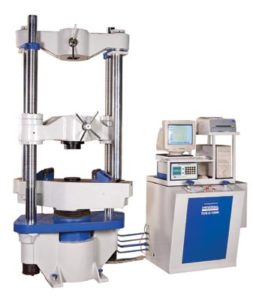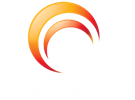
A machine used to test specimens for tensile strength, compressive strength, shear strength and to perform bend test along other important laboratory tests. The primary use of the testing machine is to create the stress strain diagram.

Once the diagram is generated, a pencil and straight edge or computer algorithm can be used to calculate yield strength, Young’s Modulus, tensile strength or total elongation.
Components of UTM
It consists of two main parts, called:
- Loading Unit
- Control Unit
Loading unit
In this unit actual loading of the specimen takes place – consists of three cross heads namely upper head, middle head and lower head. Using appropriate cross heads tensile, compressive, shear, bending load with the help of different attachment can be applied. Loading unit of a UTM consists of:
- Upper cross head – To clamp testing specimen from top
- Lower cross head – To clamp testing specimen from below
- Table – to place the specimen, used for compression test
Control Unit
The load is applied and recorded by this unit. The load is applied with control valve and released by release valve. The load is applied with the help of hydraulic pressure.
Extensometer
An instrument used to measure elongation in the material
Tests UTM can perform
- Tensile Tests
- Adhesion Tests
- Cycle tests with momentary stops
- Pull-Out Tests
- Creep Tests
- Hysteresis Tests
Displays Test Traces and Values
Test Traces: An ongoing test can be displayed as either:
- Load/Displacement
- Load/Position
- Load/Time
- Position/Time
- Displacement/Time
Digital Indicating Windows: The following are displayed:
- Maximum Load (peak hold)
- Current Load (during a test)
- Cross head Position
- Displacement (from the start of a test)
Applications of Universal Testing Machine
Universal Testing Machine can be used and applied to perform tests on the following samples:
- Rope
- Steel Rope
- Winches
- Steel Wire
- Electrical Wire
- Webbing
- Spring
- Slings
- Cable
- Nylon Rope
- Links
- Chain
- Steel Chain


